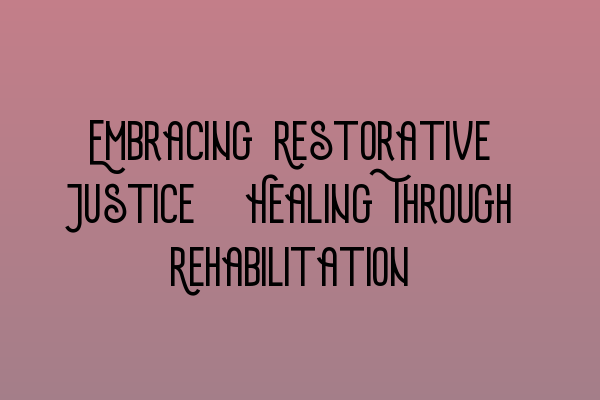Embracing Restorative Justice: Healing Through Rehabilitation
Welcome to the SQE Criminal Law & Practice Law UK blog. In this post, we will explore the concept of restorative justice, its benefits, and how it can contribute to healing through rehabilitation. As criminal law solicitors, we understand the importance of considering alternative approaches to traditional punishment, and restorative justice offers a unique opportunity for victims, offenders, and society as a whole to find closure and healing.
Understanding Restorative Justice
Restorative justice is a victim-centered approach to resolving conflicts and addressing crime. Unlike traditional punitive measures, restorative justice focuses on healing and rehabilitation rather than punishment alone. It aims to empower both victims and offenders to actively participate in the resolution process and encourages accountability, empathy, and dialogue.
By bringing together victims, offenders, and trained facilitators, restorative justice seeks to repair the harm caused by criminal acts and help individuals reintegrate into society. This approach recognizes that crime has broader social implications and that addressing the underlying causes and consequences is essential for long-term community well-being.
The Benefits of Restorative Justice
Restorative justice offers numerous benefits for victims, offenders, and communities. For victims, it provides an opportunity to be heard, express their feelings, and have a say in the resolution process. It can support their healing journey, as they can confront the offender and seek answers and closure.
Offenders also benefit from restorative justice by allowing them to take responsibility for their actions, make amends, and rebuild their lives. By engaging in meaningful dialogue with victims, they can gain insight into the consequences of their actions, develop empathy, and work towards rehabilitation.
Moreover, restorative justice promotes community healing and cohesion. By involving affected parties and community members, it fosters a sense of collective responsibility and encourages the development of solutions that address underlying social issues. It also reduces the likelihood of recidivism, as offenders are more likely to change their behavior when they are actively engaged in their own rehabilitation process.
Embracing Restorative Justice in the UK
The SQE Criminal Law & Practice Law UK is committed to promoting restorative justice as a valuable approach within the criminal justice system. We believe in the power of dialogue, empathy, and rehabilitation in resolving conflicts and reducing crime rates.
If you are interested in learning more about restorative justice and its applications, we offer comprehensive SQE 1 and SQE 2 Preparation Courses to help future solicitors navigate this complex field. Our courses provide in-depth knowledge and practical skills necessary to excel in the SQE exams and practice law effectively.
As you prepare for the SQE exams, we also recommend exploring our related articles:
- SQE 1 Practice Exam Questions
- SQE 1 Practice Mocks FLK1 FLK2
- SQE 2 Preparation Courses
- SQE 1 Preparation Courses
- SRA SQE Exam Dates
These articles will provide you with additional resources to deepen your understanding of the SQE exams and enhance your legal knowledge.
Conclusion
Restorative justice has the potential to transform our criminal justice system by prioritizing healing and rehabilitation. By embracing this approach, we can work towards a more inclusive, empathetic, and effective system that addresses the needs of victims, offenders, and communities.
At SQE Criminal Law & Practice Law UK, we are dedicated to promoting restorative justice and preparing future solicitors for the challenges and opportunities it presents. Consider joining our SQE 1 and SQE 2 Preparation Courses to develop the skills necessary to navigate this evolving field.
